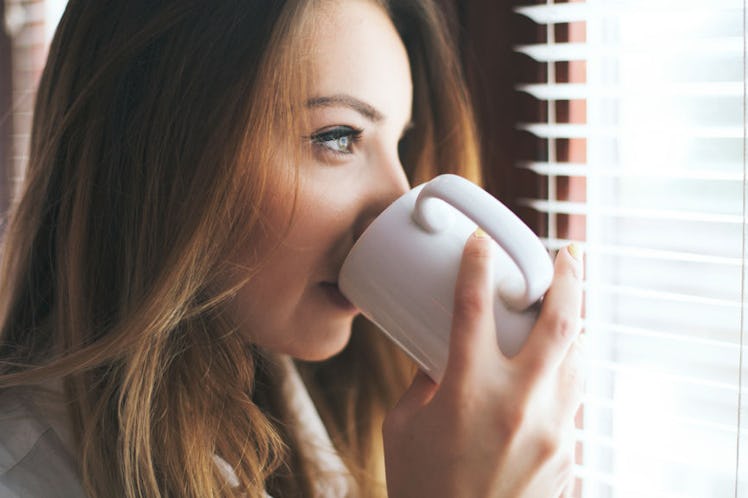
This Really Simple Life Hack Might Protect You From Getting Sick, According To Science
Cold and flu season has snuck up on us once again, friends, but unintentionally crossing paths with other people’s germs isn’t the only way to catch a bug this season, or any time of year for that matter. According to new research, if you know it’s going to be a bright, sunshiny day, then you should probably open up the blinds and let the rays gleam through, because as it turns out, the health benefits of sunshine aren’t exclusive to plants. Who would have thought, right? But in all seriousness, letting the sunshine into your living space, work cubicle — basically anywhere you exist that’s particularly dreary — is going to be beneficial to your health, because bacteria lurks in the shadows like the true, IRL nightmares they are.
So here’s the scoop: Sunshine’s great for soaking up some vitamin D and all, but you apparently don’t have to spend hours outdoors to reap another pretty significant health benefit of sunlight. In a recent study published in the journal Microbiome, researchers from the University of Oregon found that dust particles carrying bacteria thrive in dark spaces. More specifically, per ScienceDaily, the study found that, after 90 days of letting experimentally planted dust settle in 11 climate-controlled rooms, which the researchers designed to mimic real buildings, 12 percent of the bacteria in dimly lit rooms were alive and able to reproduce, in comparison to the 6.8 percent of bacteria off doing their thing in broad daylight. Coincidence? The study authors think not.
And you know what they say: Science doesn’t lie, and according to physician consultant and Blue Cross Blue Shield of Michigan provider, Dr. Gina Lynem-Walker, the study’s findings were spot-on. See, sunlight, as you may or may not already know, emits harmful ultraviolet (UV) rays, and as harmful as this radiation is to human skin, Lynem-Walker tells Elite Daily it’s just as harmful to single-cell bacteria. “Studies have suggested that exposure to UV light disturbs genetic material in bacteria and other microorganisms,” she explains. Translation: UV rays are powerful enough to break up the genetic makeup of bacteria. “By staying out of direct sunlight, bacteria reduce their exposure to this radiation, thereby increasing their chances of survival and allowing for higher reproduction rates.”
Basically, bacteria is to sunlight as vampires are to sunlight: both thrive in darkness. It’s kind of eerie when you think about it, right? And it's especially concerning during the fall and winter months for a few reasons: First of all, when the sun sets earlier in the day, your waking hours are much darker than they are bright, meaning your living space is going to be cast in more shadow than it will sunlight. At the same time, when temperatures drop and the weather conditions become crummy with snow and rain, it’s likely that you’ll spend more time indoors than outside in the fresh air, even if the sun is shining. Combine the two scenarios, and you're looking at a whole lot of time in the dark, aka where bacteria is festering — and the more bacteria roaming around, the higher the chances of your being exposed to it. Do you see the dilemma here?
On top of sunlight warding off bacteria in the dark corners of your home, exposure to the golden rays is also amazing for your immune system overall. Robert Glatter, M.D., an assistant professor of emergency medicine at Lenox Hill Hospital, Northwell Health, tells Elite Daily that the vitamin D you soak up via sunlight stimulates the immune system, alerting it to pay close attention to other cells, like T cells, that need to be strengthened to fight off harmful bacteria and infections — all of which is extremely helpful during sniffle season.
Unfortunately, sunlight isn’t exactly plentiful during these colder months, but Glatter insists you only need about 15 to 20 minutes of sunlight per day to optimize your body’s vitamin D production. As far as warding off harmful bacteria swarming around the dust bunnies under the couch and in the corners of your bedroom, however, Christine Greene, MPH, Ph.D., principal research investigator of contamination control at NSF International, says that using “natural light” lamps, like the ones from Phillips, is an option. “Most commercially available 'natural light' lamps screen out ultraviolet light for safety reasons — ultraviolet light is the part of the sun’s light that gives you a sunburn,” Greene tells Elite Daily over email. “However, using these lamps in areas devoid of windows or other natural light certainly cannot hurt your effort to combat bacteria.”
So let the light shine in through your windows, and turn on all the lights. Your immune system depends on it, and you'll be saying buh-bye to bacteria-filled dust bunnies this season. Take that, flu.